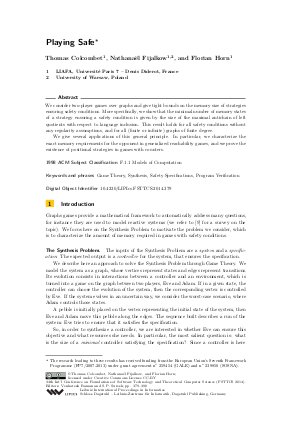Playing Safe
Authors Thomas Colcombet, Nathanael Fijalkow, Florian Horn
-
Part of:
Volume:
34th International Conference on Foundation of Software Technology and Theoretical Computer Science (FSTTCS 2014)
Part of: Series: Leibniz International Proceedings in Informatics (LIPIcs)
Part of: Conference: IARCS Annual Conference on Foundations of Software Technology and Theoretical Computer Science (FSTTCS) - License:
 Creative Commons Attribution 3.0 Unported license
Creative Commons Attribution 3.0 Unported license
- Publication Date: 2014-12-12
File

PDF
LIPIcs.FSTTCS.2014.379.pdf
- Filesize: 455 kB
- 12 pages
Document Identifiers
Subject Classification
Keywords
- Game Theory
- Synthesis
- Safety Specifications
- Program Verification
Metrics
- Access Statistics
-
Total Accesses (updated on a weekly basis)
0PDF Downloads0Metadata Views
Abstract
We consider two-player games over graphs and give tight bounds on the memory size of strategies ensuring safety conditions. More specifically, we show that the minimal number of memory states of a strategy ensuring a safety condition is given by the size of the maximal antichain of left quotients with respect to language inclusion. This result holds for all safety conditions without any regularity assumptions, and for all (finite or infinite) graphs of finite degree. We give several applications of this general principle. In particular, we characterize the exact memory requirements for the opponent in generalized reachability games, and we prove the existence of positional strategies in games with counters.
Cite As Get BibTex
Thomas Colcombet, Nathanael Fijalkow, and Florian Horn. Playing Safe. In 34th International Conference on Foundation of Software Technology and Theoretical Computer Science (FSTTCS 2014). Leibniz International Proceedings in Informatics (LIPIcs), Volume 29, pp. 379-390, Schloss Dagstuhl – Leibniz-Zentrum für Informatik (2014)
https://doi.org/10.4230/LIPIcs.FSTTCS.2014.379
BibTex
@InProceedings{colcombet_et_al:LIPIcs.FSTTCS.2014.379,
author = {Colcombet, Thomas and Fijalkow, Nathanael and Horn, Florian},
title = {{Playing Safe}},
booktitle = {34th International Conference on Foundation of Software Technology and Theoretical Computer Science (FSTTCS 2014)},
pages = {379--390},
series = {Leibniz International Proceedings in Informatics (LIPIcs)},
ISBN = {978-3-939897-77-4},
ISSN = {1868-8969},
year = {2014},
volume = {29},
editor = {Raman, Venkatesh and Suresh, S. P.},
publisher = {Schloss Dagstuhl -- Leibniz-Zentrum f{\"u}r Informatik},
address = {Dagstuhl, Germany},
URL = {https://drops.dagstuhl.de/entities/document/10.4230/LIPIcs.FSTTCS.2014.379},
URN = {urn:nbn:de:0030-drops-48571},
doi = {10.4230/LIPIcs.FSTTCS.2014.379},
annote = {Keywords: Game Theory, Synthesis, Safety Specifications, Program Verification}
}
Author Details
References
-
Patricia Bouyer, Ulrich Fahrenberg, Kim Guldstrand Larsen, Nicolas Markey, and Jirí Srba. Infinite runs in weighted timed automata with energy constraints. In Franck Cassez and Claude Jard, editors, FORMATS, volume 5215 of Lecture Notes in Computer Science, pages 33-47. Springer, 2008.

-
Arindam Chakrabarti, Luca de Alfaro, Thomas A. Henzinger, and Mariëlle Stoelinga. Resource interfaces. In Rajeev Alur and Insup Lee, editors, EMSOFT, volume 2855 of Lecture Notes in Computer Science, pages 117-133. Springer, 2003.

-
Krishnendu Chatterjee and Laurent Doyen. Energy parity games. Theor. Comput. Sci., 458:49-60, 2012.

-
Thomas Colcombet. Regular cost functions, part I: Logic and algebra over words. Logical Methods in Computer Science, 9(3), 2013.

-
Stefan Dziembowski, Marcin Jurdziński, and Igor Walukiewicz. How much memory is needed to win infinite games? In LICS, pages 99-110. IEEE Computer Society, 1997.

-
Nathanaël Fijalkow and Florian Horn. The surprizing complexity of reachability games. CoRR, abs/1010.2420, 2010.

-
Nathanaël Fijalkow and Florian Horn. Les jeux d'accessibilité généralisée. Technique et Science Informatiques, 32(9-10):931-949, 2013.

-
Hugo Gimbert. Jeux Positionnels. PhD thesis, Université Paris 7, 2007.

-
Erich Grädel, Wolfgang Thomas, and Thomas Wilke, editors. Automata, Logics, and Infinite Games: A Guide to Current Research [outcome of a Dagstuhl seminar, February 2001], volume 2500 of Lecture Notes in Computer Science. Springer, 2002.

-
Eryk Kopczyński. Personal communication.

-
Eryk Kopczyński. Half-Positional Determinacy of Infinite Games. PhD thesis, University of Warsaw, 2009.

-
Orna Kupferman. Variations on safety. In Erika Ábrahám and Klaus Havelund, editors, TACAS, volume 8413 of Lecture Notes in Computer Science, pages 1-14. Springer, 2014.

